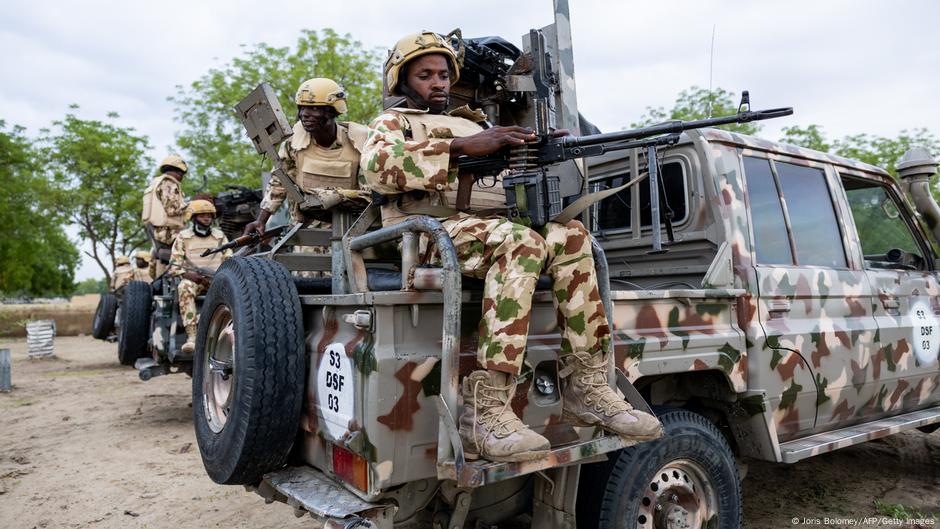[ad_1]
A recent report by Good Governance Africa indicates there is enough evidence to show the Boko Haram insurgency has renewed its offensive in Nigeria after years of relative decline.
According to Nigeria’s National Human Rights Commission, at least 2,266 people were killed by bandits or insurgents in Nigeriaduring the first half of 2025 – surpassing the total number of such deaths in all of 2024.
“We’re seeing nighttime raids, not just against civilians but also against the military. Not just to prevent reinforcement but also shows the tactical approach being used. We are seeing attacks and abductions on highways and farmlands,” Malik Samuel, a Senior Researcher with Good Governance Africa, told DW.
The latest attack in Darul Jamal, in northeastern Nigeria, which led to the killing of at least 60 people, reinforces the trend of increasing attacks.
What’s behind Boko Haram’s resurgence?
In March 2025, Niger announced its withdrawal from the Multinational Joint Task Force (MNJTF), which was mandated to secure the borders in the Lake Chad region. Initially established by Nigeria in 1994, the MNJTF expanded and adopted a more international approach with the participation of its neighbors, Niger, Cameroon, Chad and Benin.
However, following Niger’s military coup in July 2023, which overthrew the democratically elected government of President Mohamed Bazoum, Niger pulled out of MNJTF, citing the need to focus on safeguarding the homeland, particularly its oil and uranium assets.
Analysts believe that the decision has made the shared border between Nigeria and Niger porous, allowing insurgents to ramp up ammunition and increase their attacks.
“The implication of that is logistics and planning have become relatively easier for Boko Haram in terms of smuggling of arms and ammunitions into their territory,” Regional Organized Crime Observatory Coordinator for the Institute for Security Studies, Dr. Oluwole Ojewale, told DW.
In addition, some experts believe there is significant competition for the military resources that were once concentrated in the northeast region, due to other security challenges, including farmer-herder clashes, kidnappings and robbery.
“That is making the communities become more vulnerable to Boko Haram attacks,” Ojewale added.
UN reports indicate that more than 2 million people have been displaced since the crisis began in 2011. More than 40,000 people have also been killed.
Nigeria’s counter-terrorism strategy
The Nigerian military has deployed multi-pronged strategies in tackling the Boko Haram insurgency. Recent attempts have included targeted airstrikes, border monitoring and community engagements.
Nigeria’s military spokesperson, Brigadier General Tukur Gasau, told DW that the security situation in the Northeast was very stable.
“The large part of those terrorists has been decimated. They lack the capacity to occupy a place the way they did before,” Gasau said, adding that in places like Borno State, which used to be the epicenter, schools had reopened.
“Markets are on, businesses are on, the roads that used to be unmotorable due to the activities of terrorists are now open, people move freely,” he added.
However, one resident who chose to remain anonymous told DW the situation on the ground is different. “People are scared, you can feel the tension, you can feel the threat, people are being attacked, you cannot drive at night, if you’re sleeping your eyes are open, so the government needs to do more.”
According to Mutaru Mumuni Muqthar, Executive Director of the West Africa Centre for Counter Extremism (WACCE), the Nigerian military’s strength is incomparable to that of the insurgents.
“We have seen some successes of the Nigerian government against Boko Haram. But we have also seen significant comebacks that greatly undermine the state, like we’re currently seeing,” he stated.
“At the moment there is no sign that indicates the state is in full control or that the Boko Haram insurgency will end soon,” he added.
Collaboration key to dismantling Boko Haram
Malik Samuel, a senior researcher at Good Governance Africa, suggests that the state needs to enhance collaboration with both state and non-state actors to tackle the security challenge.
“If the state is implementing any response, religious leaders should be carried along,” Samuel told DW, noting that the Boko Haram conflict is backed by ideology. “So, when you have religious leaders coming out with alternative narratives to try and educate the people, it is a good step,” he added.
He also urged an increased presence of the Nigerian state in insurgent-hit villages to address the governance deficit in those areas.
For his part, Dr. Ojewale advocates for cross-border security and multinational cooperation. He also called for intervention by regional blocs, such as the Economic Community of West African States (ECOWAS), investment in security, and the African Union as the immediate solution to the crisis.
In the long term, the Nigerian government needs to halt the “propensity of the terrorist groups to drive increased recruitment which solidifies their ranks,” Ojewale added.
Some information in this article is excerpted from the DW vodcast Under the Baobab
Edited by: Chrispin Mwakideu
Source link

